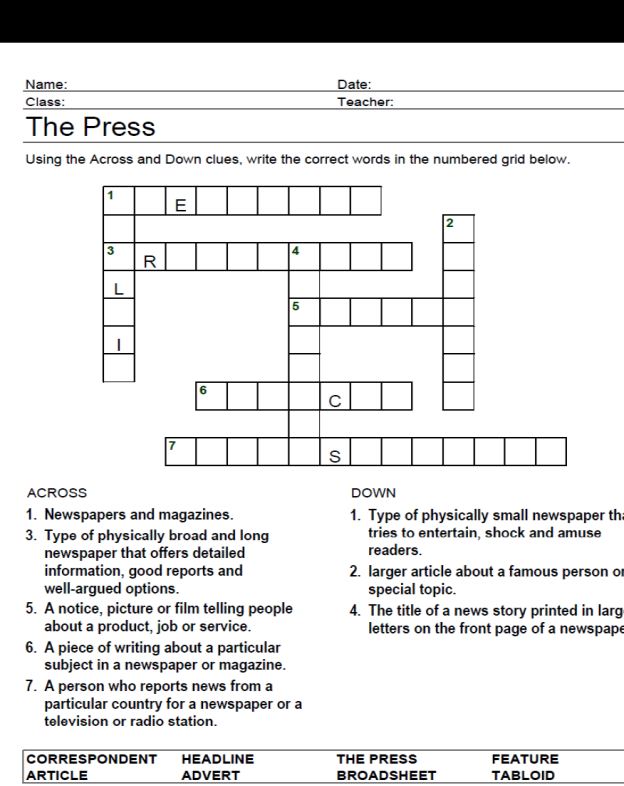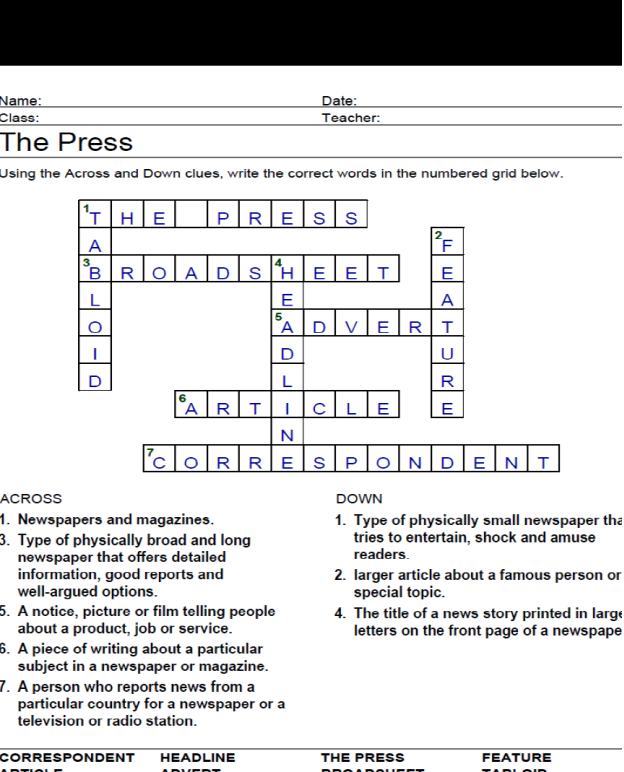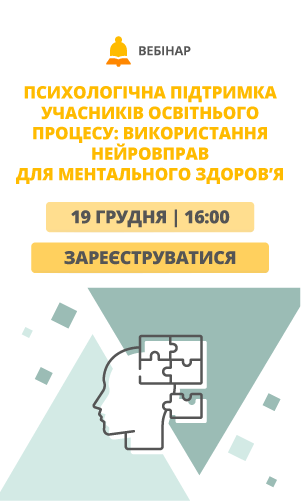Урок "Газети і журнали - пережиток минулого чи важливе джерело інформації"
ЗАКЛАД ФАХОВОЇ ПЕРЕДВИЩОЇ ОСВІТИ
«ПЕРШИЙ КИЇВСЬКИЙ ФАХОВИЙ МЕДИЧНИЙ КОЛЕДЖ»
Циклова комісія іноземних мов________________________
(назва циклової комісії)
МЕТОДИЧНА РОЗРОБКА ПРАКТИЧНОГО ЗАНЯТТЯ
з дисципліни
Іноземна мова
(назва навчальної дисципліни)
на тему
«Газети і журнали – пережиток минулого чи важливе джерело інформації»
для студентів І курсу
Спеціальностей 224.«Технології медичної діагностики та лікування», 223.«Медсестринство»
Викладач: А.В.Лисиця
Заклад фахової передвищої освіти
«Перший київський фаховий медичний коледж»
НАВЧАЛЬНО-МЕТОДИЧНА КАРТКА ПРАКТИЧНОГО ЗАНЯТТЯ
Предмет: Іноземна мова
Тема заняття: «Газети і журнали – пережиток минулого чи важливе джерело інформації»
Спеціальність: «Технології медичної діагностики та лікування», «Лабораторна діагностика»
Групи: ЛН - I, СФН – I
Мета заняття
Знати: лексику, що відповідає сфері спілкування.
Вміти: користуватись лексико-граматичним матеріалом з теми;відповідати на запитання стосовно змісту текстів; вибирати необхідну інформацію з прослуханого; висловлювати власні думки, почуття, враження, аналізувати події та факти.
Виховна: виховувати самостійність, зацікавленість у вивченні іноземної мови, чіткість висловлення думки, ввічливе ставлення один до одного.
Міжпредметна інтеграція
|
Предмети, що забезпечують дане заняття |
Предмети, що забезпечують дане заняття |
|
Англійська мова шкільний курс |
Історія |
|
Українська мова |
Світова культура |
|
Культура спілкування |
Журналістика |
Забезпечення заняття (методичне та матеріальне)
Робоча навчальна програма, роздатковий матеріал, навчально-методична картка заняття, інструкції до практичного заняття, словники, підручники, аудіо та відеоматеріал.
Література (основна та додаткова)
- Л.Г. Верба, Г.В.Верба. Граматика сучасної англійської мови. – К.: Тов «ВП Логос – М», 2012.
- С.В. М`ясоєдова. Англійська мова: 266 англійських тем. – Х.:МОСТ – Торнадо, 2000.
- Т. М. Гужва. Англійська мова: розмовні теми. - К.: Тандем 2000.
- International Express Student’s book Oxford University Press 2008
- https://www.youtube.com/watch?v=avXkRLoSta8
Організаційна структура та зміст заняття
|
№ |
Основні етапи заняття, їх Зміст та функції |
Методи контролю та навчання |
Час (хв.) |
Матеріальне та методичне забезпечення |
- Підготовчий етап заняття
|
1 |
Організація заняття |
Перевірка присутності студентів та готовності до заняття |
1-2 |
Журнал групи |
|
2 |
Постановка навчальної теми та мотивації |
Повідомлення теми заняття |
2 |
Науково-методичне обґрунтування теми (додаток №1) |
|
3 |
Актуалізація опорних знань |
Фронтальне опитування
|
8 |
Question List (додаток №2) |
- Основний етап
|
1
2
3
4
5
|
Введення нових ЛО
Читання
Перегляд відеоматеріалів та їх обговорення
Письмо
Розвиток діалогічного мовлення |
|
60 |
Список нової лексики, картки з угорським кросвордом (додатки №3, 4) Тексти “Newspapers”, “Magazines”(додатки №5, 6) Запитання до текстів Відеоматеріал “The printing process” Запитання по змісту відеоматеріалу
Вправи на картках (додатки №7, 8)
Самостійна робота студентів
|
- Заключний етап
|
1 |
Закріплення нового матеріалу |
Усне індивідуальне опитування, фронтальне опитування |
5 |
Питання (додаток №9), кросворд (додаток №10) |
|
2 3 |
Підведення підсумків Домашнє завдання |
Оцінювання Вивчити нові слова на диктант, створити власну газету |
2 2 |
|
Додаток № 1
Науково-методичне обгрунтування теми
Основною метою заняття є удосконалення вмінь та навичок переглядового, ознайомлюючого і навчального матеріалу. Особливого значення слід надавати оволодінню прийомами продуктивного осмислювання текстів та їх аналізу, збагаченню лексики, вивченню продуктивного і рецептивного граматичного матеріалу, закріпленню навичок адекватного сприйняття текстів різної тематики, що роблять можливим практичне використання набутих теоретичних знань.
Матеріали контролю вихідного рівня знань
Додаток № 2
Question List
1. What types of mass media can you name?
2. Which type of mass media do you prefer?
3. Which type of mass media is the most reliable? Which is the quickest? Which is the most fun? Which is the most up-to-date? Which one is the easiest to use?
4. Do you think that the government should control the media? Why or why not?
5. How do you think people will get information in future?
6. How often do you read a newspaper?
7. What is your favourite newspaper?
8. What is the difference between a 'tabloid' newspaper and a 'broadsheet'? Which is more popular?
9. Do people usually read regional or national newspapers?
10. Is there a lot of advertisement in newspapers?
11. Are newspapers usually based or independent?
12. Do you subscribe to a newspaper? What are the advantages of a subscription?
13. Do you like reading magazines?
14. What is your favorite magazine?
15. What kind of magazines is especially popular with women? With men? With girls? With boys?
16. When do people usually buy/read magazines?
17. What do you think about women's magazines?
18. How often do magazines usually come out?
19. Do you think that the Internet will replace other kinds of mass media completely? Why?
20. When you are using the Internet, is your privacy well protected?
21. Is there a lot of unpleasant advertisement on the Internet?
22. What sort of information can be found on the Net?
23. Can you always rely on the information you find?
24. What are the positives and negatives of the Internet?
25. Is it difficult to publish something on the Internet?
Додаток №3
TALKING POLITICS
1. Learn the dialogue by heart
–What are you doing, Steve?
–Looking through the newspapers.
–Anything in the papers?
–The news.
–Racing?
–No, political. I have just read a very interesting article in today’s paper.
–Who is the author of the article?
–The name of the author is not mentioned. The article deals with the latest development in Europe.
–You mean Eastern Europe? Am I right?
–Yes, you are. What do you think of changes that took place in Eastern Europe?
–I can tell you only the facts. The old political structures are completely dismantled. The new economic structures have not yet been built.
–That’s what the article says.
–Does the article point out that this process can’t be out short?
–There is nothing in the article about it. But it goes without saying.
–Don’t you think that nobody can predict what the rate of change will be?
–I fully agree with you here. But I am fully optimistic, I believe that all the changes are for the better.
–I don’t quite agree with you here. Take, for instance, bilateral relations
with ... They will remain important for a long period, don’t you think so?
–Of course, the bilateral relations with ... took ... years to form. They should not be underestimated.
–That’s right. They concentrate their efforts on trying to the past of Eastern Europe.
–Yes, they are making great progress.
–The situation changes very quickly.
–In fact, it is difficult to predict what will happen.
–You have said it.
2. Translate into English
1. –Що Ви читаєте?
–Я читаю сьогоднішню газету.
–Що-небудь цікаве?
–Йдеться про ситуацію на Близькому Сході.
–Ситуація напружена, так?
–Так, усе ще залишається напруженою
2. –Хто автор цієї статті?
–Прізвище автора не згадується.
–У статі пишуть, що уряд намагається покращити стан економіки у країні.
–Так, але ніяких прогнозів нема.
–Сьогодні давати якісь прогнози ризиковано.
3. –Хто бере участь у переговорах?
–Усі партії будуть брати участь у переговорах.
–Коли починаються переговори?
–Двадцять п’ятого травня.
–Які питання будуть обговорюватися?
–Найголовніше питання –ситуація у країні.
4. –Ви можете прокоментувати останні події в...
–Боюсь, що ні. Я знаю, що там дуже напружена ситуація.
–Ти знаєш подробиці?
–На жаль, я мало знаю.
5. –Ти можеш передбачити ступінь змін?
–Не думаю, що можна що-небудь передбачити.
–Будь-який прогноз ризикований.
–Звичайно. Але я оптиміст. Все буде добре.
Матеріали для основного етапу заняття
Додаток № 4
a brochure [ˈbrəuʃjuər] – брошура, проспект
a rag – інформаційна листівка
a tabloid [ˈtæblɔɪd] – малоформатна газета, «жовта» газета
a broadsheet [ˈbrɔːdʃiːt] – газета на широких шпальтах, рекламна афіша
a review [rɪˈvjuː] – огляд, рецензія
a front page – перша сторінка
a section [ˈsɛkʃən] - розділ
an article [ˈɑːtɪkl] – стаття, пункт
a supplement [ˈsʌplɪmənt] – коментар, додаток
an editorial [ɛdɪˈtɔːrɪəl] - редакція
an editor - редактор
a hack – «писака», той, хто нелегальним шляхом отримує інформацію та оприлюднює її
a feature [ˈfiːtʃər] – нарис, ессе
inbrief - коротко
a subscription [səbˈskrɪpʃən] - передплата
a cover - обкладинка
a coverage [ˈkʌvərɪdʒ] – покриття, освітлення (ТВ)
an issue [ˈɪʃuː] – випуск, видання
a heading – головний заголовок, назва рубрики
a headline - заголовок
home affairs – внутрішні справи
current events – поточні події
a circulation [səːkjuˈleɪʃən] тираж
quarterly [ˈkwɔːtəlɪ] – (що)квартально
to advertise [ˈædvətaɪz] – рекламувати
Додаток № 5
Newspapers
Newspaper is a publication that presents and comments on the news. Newspapers play an important role in shaping public opinion and informing people of current events.The first newspapers were probably handwritten news-sheets posted in public places. The earliest daily newssheet was "Acta Diurna" ("Daily Events") which started in Rome in 59 B.C. The first printed newspaper was Chinese publication called "Dibao" (pronounced "Ti -pao") started in A.D. 700's. It was printed from carved wooden blocks. The first regularly published newspaper in Europe was "Avisa Relation" or "Zeitung", started in Germany in 1609.Newspapers have certain advantages over other mass media — magazines, TV and radio. Newspaper can cover more news and in much detail than TV or radio newscast can do. Magazines focus on major national and international events of the preceding week. But newspaper focuses on local news as well and provides information and comments faster than magazine can do. There are about 1700 daily and 7500 weekly newspapers in the US. The circulation of some weeklies is no more than a few hundred of copies per issue and the circulation of some dailies is over a million of copies.There are daily newspapers and weekly newspapers. Daily newspapers print world, national and local news. Many dailies are morning papers, others are afternoon papers. Sunday issues of the dailies are usually larger than the weekday ones. They may include special sections on such topics as entertainment, finance and travel or Sunday magazine, a guide to TV programmes, colored comics. The major dailies in the US are "Christian Science Monitor", "New York Times", "USA Today", "Wall Street Journal", "Washington Post".Weekly newspapers serve usually for smaller areas. They are printed in small communities where people know each other and are interested in activities of their friends and neighbours. Weeklies report of weddings, births, deaths and news of local business and politics. Most weeklies do not print world or national news.
Додаток № 6
Magazines
Magazine is one of the major mass media. Magazine is a periodical publication, a collection of articles and stories with illustrations generally financed by advertising and/or purchase by readers. The earliest magazines developed from newspapers and booksellers catalogs. Such catalogs first appeared during the 1600's in France. In the 1700's pamphlets published at regular intervals appeared in England and America. They were literary publications. One of the first British magazines "The Gentleman's Magazine" was published from 1731 to 1914. The first American magazine was called the "American Magazine", or "A Monthly View".
Magazines are typically published weekly, biweekly, monthly, bimonthly or quarterly, with a date on the cover. They are designed to be kept for a longer time in comparison to newspapers and that is why magazines often printed on a better color or coated paper, and have covers. Magazines provide information on a wide range of topics such as business, culture, hobbies, medicine, religion, science, and sports. Some magazines entertain their readers with fiction, poetry, photography or articles about TV, or movie stars. Magazines, unlike newspapers, do not focus on daily, rapidly changing events.
There are specialized magazines intended for special business, industrial and professional groups, which are subscribed-only, more expensive, narrowly limited in circulation, and often have little or no advertising and consumer magazines intended for general public. There are several kinds of consumer magazines.
Children's magazines contain stories, jokes, articles on subjects especially interesting for children and instructions for making games or useful items. Hobby magazines are intended for collectors of coins, stamps, and other items; people interested in certain sports or games; photography enthusiasts. Intellectual magazines provide analysis of current cultural and political events. Many of them publish fiction and poetry as well. Men's magazines focus on such topics as adventure, entertainment, men's fashion and sports. Women's magazines deal with child-raising, fashion trends, romance. They offer ideas on cooking and home decorating. Many of the monthlies with big circulations are women's magazines.
Questions:
1. What did magazines develop from?
2. What is the name of the first US magazine?
3. What kinds of information do magazines provide?
4. What is the difference in contents between a magazine and a newspaper?
5. What kind of magazines are there? What do they deal with?
Vocabulary:
pamphlet [ˈpæmflət] — брошура
to entertain — розважати
fiction — художній твір
to focus — зосередитися
rapidly — швидко
to be intended — призначатися
consumer magazines — масові журнали
photography enthusiast [ɪnˈθuːzɪæst] — фотолюбитель
adventure — пригоди
child-raising — виховання дітей
Додаток № 7
Match the words with the right description
Brochure A newspaper that has small pages, short articles and lots of photographs. They are often considered to be less serious than other newspapers.
Rag A newspaper that is printed on large sheets of paper measuring approximately 38 cm by 61 cm. They are generally considered to be more serious than other newspapers.
Tabloid A magazine or booklet with pictures that gives you information about a product or service.
Broadsheet People refer to a newspaper as a rag when they have a low opinion of it.
Review A piece of writing in a newspaper or magazine.
Front page One of the parts into which a newspaper is divided.
Section A front page article or picture appears on the front page of a newspaper because it is very important or interesting.
Headline The title of a newspaper story, printed in large letters at the top of it, especially on the front page. Headlines are the main points of the news which are read on radio or TV.
Article A report in a newspaper or magazine in which someone gives their opinion of a new book, film, TV programme, record, play or concert.
Feature A prominent or special article, story, or department in a newspaper or periodical.
Supplement An article in a publication expressing the opinion of its editors or publishers
Editorial A separate part of a magazine or newspaper often dealing with a particular topic.
Reporter A person whose job is to collect news or other information and write about it in newspapers or magazines or talk about it on TV or radio.
Editor A journalist who regularly writes particular kind of article in a newspaper or magazine.
Hack The person who is in charge of a newspaper and who decides what will be published in it. A journalist who is responsible for a particular section of a newspaper. A person who checks and corrects texts before they are published.
Journalist Someone who writes new articles or broadcasts new reports.
Columnist A journalist who writes for money without worrying very much about the quality of their writing.
Foreign correspondent A correspondent who sends news reports or commentary from a foreign country for broadcast or publication.
Додаток № 8
- Divide the words below into the correct categories.
journalist tabloid editorial
columnist daily rag
feature foreign correspondent headline
broadsheet reporter quality supplement
article hack front page
review
1 people who work on a newspaper: …………………………………………………………………………………
2 types of newspaper: ………………………………………………………………………………….
3 what you find in a newspaper: ………………………………………………………………………………….
Which of these words collocate with news?
Example newsroom
room stand print conference
agency flash hound letter
worthy paper agent desk
Complete these sentences with some of the words above.
1 The ____________ is the place where journalists write their reports.
2 You can buy a ‘paper at a news__________ or at a news___________ in the street.
3 If it is a good story, it is news_________.
4 A good reporter is sometimes called a news___________.
5 Politicians often inform journalists about their actions at news____________s.
Choose the correct words to complete the text
write the stories but the controls the of the newspaper. He or she decides which stories should go on the . Editors also write the for the main stories. The Sunday papers have more sections than papers , for example they have a sports section with of different sporting events, a section with articles about money and the stock market and a section. This often has interviews with like film stars and singers. Newspapers are cheap in the UK and they make lots of money by including . news is one of the fastest growing areas of the .
Think of answers for these questions. Write your answers.
What do you think of the press in your country? Is it sensationalised and expletive? Or is it serious and impartial? What do you think the role of the press should be in society?
Матеріали для заключного етапу заняття
Додаток № 9
Answer the questions
- What is your favourite newspaper?
- What is the difference between a 'tabloid' newspaper and a 'broadsheet'? Which is more popular?
- Do people usually read regional or national newspapers?
- Is there a lot of advertisement in newspapers?
- Are newspapers usually based or independent?
- Do you subscribe to a newspaper? What are the advantages of a subscription?
- Do you like reading magazines?
- What is your favorite magazine?
- What kind of magazines is especially popular with women? With men? With girls? With boys?
- When do people usually buy/read magazines?
- What do you think about women's magazines?
- How often do magazines usually come out?
Додаток № 10




про публікацію авторської розробки
Додати розробку
